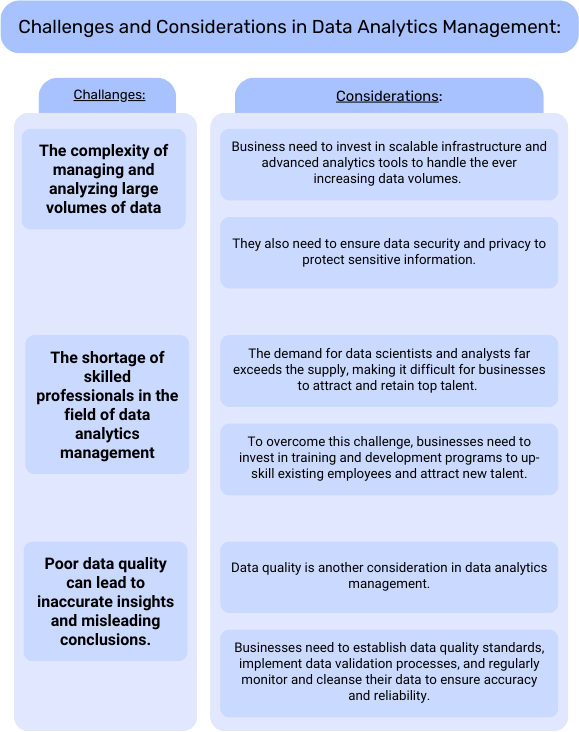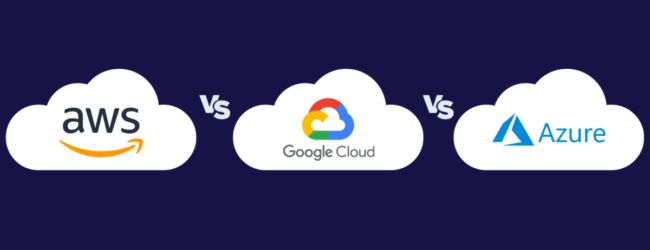
How Data Analytics Management is Shaping the Future of Business
Author: Kysha Praciak
· 5 mins readIntroduction
Data analytics management has become an integral part of modern business operations. With the exponential growth of data in recent years, businesses are realizing the immense value that can be derived from analyzing this data effectively. In this article, we will explore the importance of data analytics management for businesses and how it is transforming industries. We will also delve into the key components of effective data analytics management, the challenges and considerations that come with it, and the tools and technologies used in the process. By the end, you will have a comprehensive understanding of how data analytics management is shaping the future of business.
Importance of Data Analytics Management for Businesses
Data analytics management plays a crucial role in driving business growth and success. By analyzing large volumes of data, businesses gain valuable insights into customer behavior, market trends, and operational efficiency. These insights enable businesses to make informed decisions, optimize processes, and identify new opportunities. Without effective data analytics management, businesses would be left in the dark, relying on guesswork rather than data-driven strategies.
One of the key benefits of data analytics management is the ability to enhance customer experiences. By analyzing customer data, businesses can personalize their offerings and tailor their marketing strategies to meet individual needs. This leads to increased customer satisfaction, loyalty, and ultimately, higher revenues. Additionally, it helps businesses identify patterns and trends that can predict customer preferences, allowing them to stay ahead of the competition.
How Data Analytics Management is Transforming Industries
Data analytics management is revolutionizing industries across the board, from finance and healthcare to retail and manufacturing.
- In finance, data analytics management is used to detect fraudulent activities, identify investment opportunities, and assess risk.
- In healthcare, it is used to predict disease outbreaks, optimize treatment plans, and improve patient outcomes.
- Retail businesses rely on data analytics management to understand customer buying behavior, optimize inventory management, and personalize marketing campaigns.
- The manufacturing industry uses it to improve operational efficiency, optimize supply chains, and reduce costs.
The impact of data analytics management can also be seen in emerging technologies such as artificial intelligence and machine learning. These technologies rely heavily on data analysis to make accurate predictions and drive intelligent decision-making. Data analytics management is the backbone of these technologies, providing the data and insights necessary for their success. As industries continue to evolve, it will play an increasingly central role in driving innovation and competitive advantage.
Need Expert IT Solutions?
Get a Free Consultation Today!
Whether you’re dealing with network issues, cybersecurity concerns, or software integration, our team of IT experts is here to help. Don’t let tech troubles slow you down. Call us now for a complimentary initial assessment, or click below to fill out our quick contact form. Let’s make technology work for you.
Key Components of Effective Data Analytics Management
Effective data analytics management requires a combination of people, processes, and technology:
- The first component is skilled professionals who can collect, analyze, and interpret data effectively.
- Data scientists and analysts play a critical role in uncovering meaningful insights from complex datasets.
- These professionals should have a strong understanding of statistical analysis, data visualization, and programming languages such as Python or R.
- The second component is a well-defined data analytics strategy.
- This involves setting clear objectives, defining key performance indicators, and establishing processes for data collection, storage, and analysis.
- A robust data governance framework is also essential for ensuring data quality, security, and compliance.
- The third component is the use of advanced tools and technologies.
- Data analytics platforms and software provide the necessary infrastructure for data storage, processing, and visualization.
- These tools enable businesses to derive insights from large datasets quickly and accurately.
- Cloud computing and big data technologies have revolutionized data analytics management by providing scalable and cost-effective solutions.
Implementing a Data Analytics Management Strategy
Implementing a data analytics management strategy requires careful planning and execution:
- The first step is to assess the current state of data analytics within the organization. This involves evaluating existing data sources, infrastructure, and skill sets. Once the baseline is established, businesses can identify areas for improvement and set realistic goals.
- The second step is to develop a roadmap for implementing the data analytics management strategy. This includes defining the desired outcomes, identifying the necessary resources, and establishing a timeline for implementation. It is important to involve key stakeholders from various departments to ensure buy-in and alignment with business objectives.
- Data governance plays a crucial role in implementing a data analytics management strategy, leading to the third step, businesses need to establish clear policies and procedures for data collection, storage, and usage. This includes defining data ownership, access controls, and data quality standards. Regular audits and monitoring are also essential to ensure compliance and maintain data integrity.

Tools and Technologies for Data Analytics Management
There is a wide range of tools and technologies available for data analytics management. These tools help businesses collect, store, process, and visualize data effectively. Here are some popular ones:
- Data Analytics Platforms: Platforms such as Tableau, Power BI, and QlikView provide intuitive interfaces for data visualization and analysis. These platforms allow businesses to create interactive dashboards, reports, and charts to gain insights from their data.
- Machine Learning and AI: Tools such as TensorFlow, scikit-learn, and PyTorch enable businesses to build and deploy machine learning models for predictive analytics. These models can be used to make accurate predictions, automate decision-making, and uncover hidden patterns in data.
- Big Data Technologies: Technologies such as Hadoop, Spark, and Apache Kafka are widely used for processing and analyzing large volumes of data. These technologies provide scalable and distributed computing capabilities, allowing businesses to derive insights from massive datasets.
- Data Integration and ETL Tools: Tools such as Informatica, Talend, and SSIS facilitate the extraction, transformation, and loading of data from various sources. These tools help businesses consolidate and integrate data from multiple systems for analysis.
Training and Certification in Data Analytics Management
To excel in data analytics management, professionals can benefit from training and certification programs. These programs provide in-depth knowledge and practical skills required to analyze and manage data effectively. Some popular certifications include:
- Certified Analytics Professional (CAP): Offered by INFORMS, this certification validates the candidate’s knowledge and skills in analytics and data-driven decision-making.
- Certified Data Management Professional (CDMP): Offered by DAMA International, this certification focuses on data management practices, including data governance, data quality, and data integration.
- Microsoft Certified: Azure Data Scientist Associate: This certification validates the candidate’s ability to use Azure technologies for data analysis and machine learning.
Businesses can also benefit from providing training programs for their employees. These programs can be customized to meet specific business needs and help employees develop the necessary skills to drive data-driven decision-making.
Data Analytics Management Services
For businesses that lack the resources or expertise to implement data analytics management internally, there are specialized service providers that offer these services. These service providers have the expertise and infrastructure to handle data analytics processes, allowing businesses to focus on their core operations. Services offered may include data collection and integration, data analysis, data visualization, and data governance.
When choosing a data analytics management service provider, businesses should consider factors such as industry experience, expertise in specific analytics tools and technologies, and data security and privacy measures. It is also important to define clear goals and expectations upfront to ensure alignment with business objectives.
Conclusion
Data analytics management is poised to play an increasingly critical role in shaping the future of business. As data continues to grow exponentially, businesses that can effectively collect, analyze, and interpret data will have a significant competitive advantage. The insights derived from data analytics management will drive innovation, optimize processes, and enable businesses to make data-driven decisions.
To succeed in this data-driven future, businesses need to invest in skilled professionals, well-defined strategies, and advanced tools and technologies. They also need to overcome challenges such as data complexity and talent shortage. By doing so, businesses can harness the power of data analytics management to drive business forward and shape the future of their industries.
Additional Resources
For those interested in exploring Data Analytics and Business Decisions further, follow the links to our blog and services, offering in-depth insights and practical guidance.
References
Certified Analytics Professional. (n.d.). Retrieved from https://www.certifiedanalytics.org/
CDMP. (n.d.). The Global Data Management Community. Retrieved from https://cdmp.info/
Microsoft. (n.d.). Azure Data Scientist Certification. Retrieved from https://learn.microsoft.com/en-us/credentials/certifications/azure-data-scientist/





Share